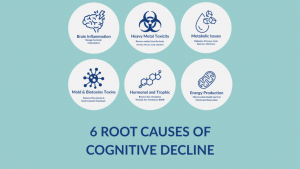Inflammation and the Inflamed Brain: How Chronic Inflammation Damages Memory
Last Updated: October 2025
Most people think of inflammation as swelling, pain, or redness in the body. But did you know that inflammation also affects the brain—and may be one of the leading causes of memory loss, brain fog, and even Alzheimer’s disease? At The Carroll Institute in Sarasota, Dr. Garland Glenn, DC, PhD, AFMC helps patients identify and reverse the hidden inflammation that drives cognitive decline. By uncovering its root causes, you can calm the “fire in the brain” and restore clarity, focus, and memory.
What Is Brain Inflammation?
Inflammation is the immune system’s natural response to injury or infection. In small doses, it helps the body heal. However, when inflammation becomes chronic—lasting for months or years—it can damage tissues, including brain cells. This condition is known as neuroinflammation. Instead of protecting neurons, the immune system begins to harm them, slowing signaling, impairing memory, and even killing brain cells.
Neuroinflammation is now recognized as a major driver in the development of Alzheimer’s and other neurodegenerative diseases (NIH, 2022). Fortunately, it’s also reversible—especially when the underlying causes are found and treated early.
How Chronic Inflammation Affects Memory and Cognition
When the brain is inflamed, its communication network becomes disrupted. Inflammation can block neurotransmitter activity, reduce blood flow, and impair mitochondrial energy production. As a result, neurons can’t fire efficiently, and areas responsible for focus, recall, and decision-making begin to slow down.
- Memory problems: Inflammation affects the hippocampus—the brain’s memory center—leading to forgetfulness and word-finding difficulty.
- Brain fog: Widespread inflammation slows information processing and causes mental fatigue.
- Mood changes: Chronic inflammation is linked to anxiety, irritability, and depression.
- Neurodegeneration: Long-term inflammation increases amyloid plaque and tau tangles, the hallmarks of Alzheimer’s disease.
Think of neuroinflammation as “smoke damage” inside your brain. The longer it continues, the harder it is for neurons to communicate. That’s why identifying and extinguishing inflammation early is critical for long-term cognitive health.
The Most Common Root Causes of Brain Inflammation
Inflammation doesn’t appear out of nowhere—it’s almost always triggered by other hidden imbalances in the body. The most common causes include:
- Leaky gut and gut dysbiosis: When the intestinal barrier is compromised, bacteria and toxins can enter the bloodstream, triggering immune activation and brain inflammation. Learn more in The Gut-Brain Connection.
- Toxin and mold exposure: Environmental toxins and mycotoxins can inflame the nervous system and increase oxidative stress. See Toxins and Brain Decline.
- Chronic infections: Viruses like Epstein-Barr and bacteria such as Borrelia (Lyme disease) keep the immune system overactive. Read Chronic Infections and the Brain.
- Hormone imbalances: Low thyroid or sex hormones can reduce the body’s ability to control inflammation. Explore Hormone Imbalances and Brain Health.
- Insulin resistance: High blood sugar promotes inflammation throughout the body, including the brain. See Blood Sugar and Brain Health.
How Functional Neurology and Functional Medicine Work Together
At The Carroll Institute, Dr. Glenn combines Functional Neurology and the Bredesen ReCODE Protocol to identify and calm inflammation from both sides—the neurological and the metabolic. Functional Neurology helps re-establish balanced brain activity, while Functional Medicine addresses the body-wide triggers fueling the inflammation in the first place.
For example, when brain inflammation causes one hemisphere to become underactive, Dr. Glenn uses targeted neuroplastic exercises to restore balance. At the same time, he uses lab testing to uncover inflammatory markers like C-reactive protein (CRP), mycotoxins, or autoimmune antibodies. By treating both the cause and the effect, patients experience faster, longer-lasting results.
Anti-Inflammatory Therapies That Support Brain Healing
Once the root causes of inflammation are identified, personalized interventions can help the brain recover. These often include:
- Anti-inflammatory nutrition: Low-glycemic, plant-rich diets and omega-3 fats help cool inflammation naturally.
- Photobiomodulation therapy: Light therapy using the Neuronic Photobiomodulation Helmet improves oxygenation and reduces oxidative stress in the brain.
- Targeted supplementation: Nutrients like curcumin, resveratrol, vitamin D, and magnesium can modulate immune activity.
- Gut repair and detoxification: Healing the gut lining and safely removing toxins reduces inflammatory triggers.
- Stress and sleep optimization: Balanced cortisol levels and deep sleep support immune balance and brain detoxification.
How Quickly Can Brain Inflammation Improve?
Every patient’s journey is unique, but many begin to notice improvements in clarity, focus, and energy within weeks of addressing inflammation. Over time, as immune balance is restored and neuroplasticity is stimulated, memory and mood often follow. Consistency is key—the longer inflammation stays under control, the stronger brain function becomes.
Hope for the Inflamed Brain
Chronic inflammation doesn’t have to lead to Alzheimer’s or lifelong cognitive loss. By uncovering and correcting the root causes, the brain can begin to heal. Whether you’re just starting to notice brain fog or have been diagnosed with mild cognitive impairment, it’s not too late to take action. Book a Discovery Call with The Carroll Institute today to begin your personalized plan for reversing neuroinflammation and restoring optimal brain health.
Sources
- Rationale for a Multifactorial Approach to Reversing Cognitive Decline — NIH (2022)
- Reversal of Cognitive Decline — NIH (2014)
- Precision Medicine and Alzheimer’s Disease — NIH (2023)
- Setting the Record Straight: Yes, Cognitive Decline Can Be Reversed — Apollo Health
Medically reviewed by Dr. Garland Glenn, DC, PhD, AFMC (Advanced Functional Medicine Clinician)
The Carroll Institute — Sarasota, FL
Learn more about Dr. Glenn’s background and credentials: About Dr. Garland Glenn
This content is for educational purposes only and does not replace personalized medical advice.

Dr. Garland Glenn, DC, PhD, IFM, AFMC
Founder & Clinical Director, The Carroll Institute — Sarasota, FL
Dr. Garland Glenn is a board-certified chiropractic physician and functional medicine practitioner specializing in cognitive health, neurodegeneration, and root-cause medicine. Certified as an AFMC (Advanced Functional Medicine Clinician) and Institute for Functional Medicine (IFM) trained, he has also completed over 500 hours of advanced training in Functional Neurology under Dr. Ted Carrick, founder of the Carrick Institute.
At The Carroll Institute, Dr. Glenn leads Sarasota’s only ReCODE-certified Functional Neurology program, helping patients reverse or prevent cognitive decline through the Bredesen ReCODE Protocol, neuroplasticity exercises, and personalized functional medicine care.
Learn more about his background and approach at About Dr. Garland Glenn.
– schedule now –
free discovery call
To help you get started, we offer a free 20-minute Discovery Phone Consultation. During this call, you will be able to talk with one of our Certified Brain Health Coaches about what going on with you or your loved one and find out if we can help. Please review our FAQs prior to scheduling your free call. We look forward to talking with you soon and helping you Save Your Brain.
(yes, it’s totally free!)
ReCODE® is a registered program developed by Dr. Dale Bredesen and licensed through Apollo Health. Dr. Garland Glenn is a certified ReCODE practitioner.


